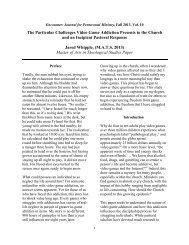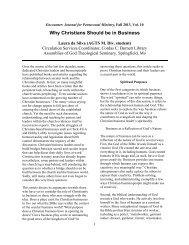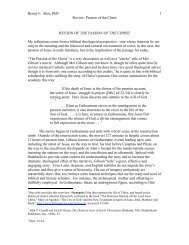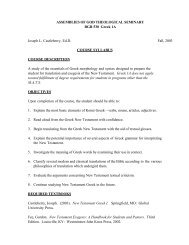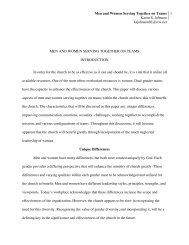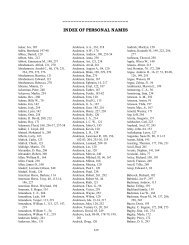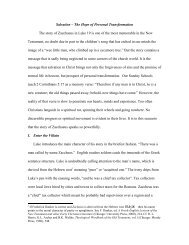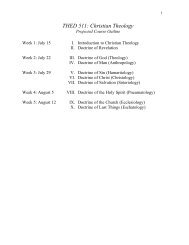Encounter: Journal for Pentecostal Ministry - Assemblies of God ...
Encounter: Journal for Pentecostal Ministry - Assemblies of God ...
Encounter: Journal for Pentecostal Ministry - Assemblies of God ...
You also want an ePaper? Increase the reach of your titles
YUMPU automatically turns print PDFs into web optimized ePapers that Google loves.
create ever more activity, fill<br />
our emptiness with external<br />
stimuli to avoid the disquiet<br />
in our soul. 8<br />
Carl Jung wrote, “Hurry is not <strong>of</strong> the devil;<br />
hurry is the devil.” 9 Spiritual maturity and<br />
discipleship take time. Just like relationships<br />
with family, a deep relationship with <strong>God</strong><br />
requires unhurried time away from the many<br />
distractions <strong>of</strong> life. A life <strong>of</strong> love requires<br />
“interruptibility”—the ability to pause and<br />
react with love to spontaneous needs that do<br />
not appear on a schedule.<br />
The Cultural Subversions behind<br />
Busyness<br />
Most busy people are, in fact, aware <strong>of</strong> the<br />
harmful effects <strong>of</strong> “hurry sickness.” They<br />
complain about their busy lifestyle and<br />
express a longing <strong>for</strong> rest and a slower pace.<br />
Why, then, do Americans continue to feel so<br />
busy? More is at work than meets the eye.<br />
The path to a healthier, slower life in which<br />
deep discipleship can occur requires an<br />
understanding <strong>of</strong> the underlying <strong>for</strong>ces that<br />
drive Americans to ever-increasing<br />
busyness.<br />
The Economics <strong>of</strong> Busyness<br />
A short history <strong>of</strong> busyness in the modern<br />
world provides helpful insights. Be<strong>for</strong>e the<br />
industrial revolution, even the lowest classes<br />
<strong>of</strong> society had plenty <strong>of</strong> free time. 10<br />
Agricultural work included brief periods <strong>of</strong><br />
strenuous, long hours, but also many periods<br />
<strong>of</strong> slowness and easier labor. In fact, when<br />
eighteenth century merchants tried to<br />
increase productivity from rural agricultural<br />
workers by having them work at weaving<br />
cloth in the winter, workers generally<br />
preferred to have more free time with family<br />
than to earn more money. In order to get<br />
employees to work more, employers<br />
discovered that the best way was to reduce<br />
2<br />
wages until employees were <strong>for</strong>ced to work<br />
more to support their families. 11<br />
The progression continued throughout the<br />
industrial revolution, increasing the work<br />
day to twelve to fourteen hours a day, six<br />
days a week. In response, labor unions<br />
throughout the nineteenth and early<br />
twentieth centuries organized to reduce<br />
work hours. They were largely successful,<br />
managing to reduce the work week to eight<br />
hours per day, five days a week, resulting in<br />
the modern, <strong>for</strong>ty-hour standard. 12<br />
Interestingly, the ef<strong>for</strong>t to reduce the<br />
workday ultimately found friends among<br />
employers as well, who observed that<br />
shorter work days actually benefitted the<br />
company. More rest meant workers who<br />
worked harder and safer. More importantly,<br />
economists observed that demand <strong>for</strong><br />
products could be increased if the average<br />
consumer had more time <strong>of</strong>f work in which<br />
to spend their money. The strategy worked.<br />
In fact, “Americans have been found to<br />
spend more time shopping than anyone else.<br />
They also spend a higher fraction <strong>of</strong> the<br />
money they earn.” 13<br />
This transition changed the meaning <strong>of</strong><br />
leisure. In the past, leisure meant slowing<br />
down, spending time with family, relaxing<br />
contemplatively in nature, and attending to<br />
other mental and spiritual concerns. Today,<br />
although working hours have decreased, it is<br />
<strong>for</strong> another purpose—so that workers have<br />
time to spend their hard-earned money. The<br />
overall result is that even leisure time is<br />
busy. The busyness <strong>of</strong> non-working hours<br />
continues to increase with technological<br />
developments and the ever-increasing<br />
availability <strong>of</strong> hyper-sensory<br />
entertainment. 14<br />
Furthermore, because leisure time is now<br />
associated with spending, workers are




